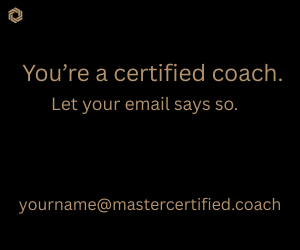Despite the havoc wrought by COVID-19 on the global landscape, people continue to move to new countries for a variety of purposes. According to the International Organization for Migration, in 2019, there were 272 million international migrants out of a global population of 7.7 billion, which means that one in every 30 people is a migrant. (To compare – In 1995 – 174 million)
I believe that it’s important to be aware of this trend and expand our horizons by diving into this realm of opportunities. Learning new languages and getting to know other cultures broadens our worldview and enhances the quality of our ways as humans and coaches.
For many immigrants, it’s a new normal to speak several languages in different contexts. However, it’s quite different when it comes to professional communication.
Here are five tips on how to coach effectively in a foreign language.
1. Be brave.
In a coaching session, idioms and cultural context are very important, which is why some coaches may be cautious about professional exposure in a foreign language even if they have a high level of it. They are afraid they may misunderstand or not be able to express themselves properly. However, words (or strong questions) are not everything in coaching. Other important aspects include partnership, ethics, presence, active listening, etc.
Once you have professional proficiency in a language that is not your mother tongue, don’t be afraid to offer and promote your coaching. Courage is one of the key qualities of a coach. By showing it in different manifestations, we enhance our personality and the quality of our coaching.
2. Be open to the unknown.
There may be some words or phrases you don’t know, but in coaching, we never take for granted words and concepts even in our own language. They say that a good coach is blind and deaf. We keep asking the meaning of the words to figure out what they mean for the client, in their picture of the world irrespective of our understanding of the word. For the client, it may mean something totally different.
But what if we don’t understand the meaning and it interferes with our understanding of the context? We can always ask it out of the partnership. Of course, it might be irritating to ask the meaning of words several times in one session, but if it’s only once every several sessions, I think it’s fine.
After the meeting, in your reflection time, you can go to the dictionary and learn the word and maybe some contexts it’s used in.
3. Remember you are a gift to your client.
Here there are two concepts I’d like to mention:
- A coach is the best instrument in coaching.
- We don’t only listen to the words, we listen beyond them.
It means that your personality, empathy, ethics, intuition, listening skills, etc., may make up for the fact that you are not a native speaker. In my early practice, I had coaching clients in English and Spanish, the languages I have professional proficiency in. Despite the fact that I was a beginner in coaching and a native speaker of Russian, these coaching relationships gave very fruitful results and high customer satisfaction.
4. Take it professionally – improve the language in different ways.
Apart from traditional ways of learning languages, there are numerous ways to enhance your coaching AND your language skills. Within the International Coaching Federation (ICF) there are great opportunities to learn from coaches in different ICF Chapters, to take coaching courses, watch webinars and demos, all in different languages.
Each language provides a different perspective on the world. As numerous scientific studies show, we see the world according to the framework our language imposes on us. By learning from different teachers from different cultures we can expand our coaching skills exponentially.
My personal favorite is to have coaching books in several languages on the bookshelf. I also read and reread competencies and ethics in the languages I speak.
5. Learn about your client’s culture not only the language.
ICF’s Updated Core Competencies include a new dimension, encouraging coaches to be aware of the influence of cultural differences and respect them. Culture is not always obvious, there are many rules unwritten and unspoken. It helps to be curious, to ask, to explore and to pay close attention to the manifestations and habits especially when things feel different from our own culture.
Be brave, be bold, delve into the world of coaching in another language and you’ll get incredible insights about the world and about yourself.
Disclaimer
The views and opinions expressed in guest posts featured on this blog are those of the author and do not necessarily reflect the opinions and views of the International Coach Federation (ICF). The publication of a guest post on the ICF Blog does not equate to an ICF endorsement or guarantee of the products or services provided by the author.
Additionally, for the purpose of full disclosure and as a disclaimer of liability, this content was possibly generated using the assistance of an AI program. Its contents, either in whole or in part, have been reviewed and revised by a human. Nevertheless, the reader/user is responsible for verifying the information presented and should not rely upon this article or post as providing any specific professional advice or counsel. Its contents are provided “as is,” and ICF makes no representations or warranties as to its accuracy or completeness and to the fullest extent permitted by applicable law specifically disclaims any and all liability for any damages or injuries resulting from use of or reliance thereupon.
Authors
Post Type
Blog
Audience Type
Coach Educators, Experienced Coaches, External Coaches, ICF Chapter Leaders, Internal Coaches, New Coaches, Professional Coaches, Team and Group Coaches
Topic
Coaching Toolbox, Discover - Your Coaching Career
Related Posts
The Coaching Trap: When Empathy Becomes Exhaustion
Prepare yourself for the fact that this will not be about you…
Your Guide to Preparing for the ACC Exam
Much like a smartphone upgrade that introduces improvements for a smoother user…
How Coaching Is Driving Inclusion Around the Globe: Lessons from Local ICF Chapters
When a group of mothers in Kazakhstan, many of whom had never…








